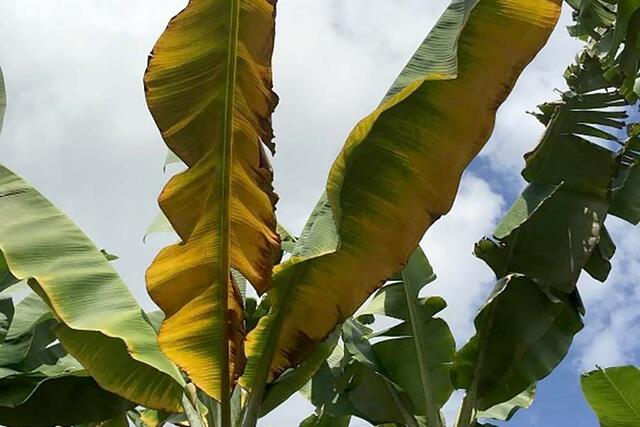Pest Profile: Panama disease tropical race 4 in Australia
Panama TR4 poses one of the greatest threats to banana production worldwide. It is caused by the soilborne fungus Fusarium oxysporum f. sp. cubense tropical race 4, which invades the roots of banana plants, limiting the supply of water and nutrients. Externally, early indications of infection include wilting and yellow colouring of leaf margins. As the infection advances, the margins of the leaves turn brown, and the plant eventually dies. Throughout the infection, the ability of the plant to yield banana fruit is greatly reduced, although the disease does not directly affect the fruit.
The fungus can remain undetected in the soil for lengthy periods of time. Due to the extended period between initial infection and disease development, spores may have already spread before external symptoms are expressed. This biology of the disease makes containment challenging and eradication highly unlikely.
Source: QDAF.
Panama TR4 was first discovered in Taiwan in the 1960s. The disease then continued to spread across South-East Asia. It was first detected in Australia in 1997 near Darwin. For almost two decades, strict management successfully contained the distribution of the disease to within the Northern Territory.
In Australia, bananas are a large industry, with almost all fruit produced for the domestic market. Panama TR4 disease-susceptible Cavendish bananas make up 97% of bananas produced in Australia. Correspondingly, the control and management of disease is essential to protect Australian consumer supply. This is particularly important in Queensland, where 94% of our bananas are produced.
In 2005, Panama TR4 was detected in the Philippines. The Australian Centre for International Agricultural Research (ACIAR) and Queensland Department of Agriculture and Fisheries (QDAF) partnered with the Philippine government on projects supporting impacted smallholder banana farmers. These collaborations also helped inform approaches to Panama TR4 preparation and management in Australia.
In 2015, the disease was detected on a farm in the Tully Valley, Far North Queensland. Since this detection, intensive quarantine measures have been in place to manage and prevent further spread of the disease across the broader banana horticultural industry. These measures include on-farm risk mitigation procedures that aim to reduce the movement of soil and plant material coming off the infected property. For example, restricting access to the property, zoning of areas for farming, separation or exclusion, and decontamination of farm materials, equipment and footwear. Additionally, early destruction of infected plants in accordance with strict biosecurity protocols is critical to reducing the risk of disease spread and maintaining on-farm viability. Until 30 June 2023, Biosecurity Queensland's Panama TR4 Program has also undertaken routine surveillance across impacted and at-risk farms throughout Far North Queensland for early disease detection. As a result, the disease has successfully been contained to the Tully Valley area.
Since the disease was first detected in Queensland, the Queensland Government has worked alongside the peak industry representative body, the Australian Banana Growers’ Council for successful Panama TR4 control and containment. From 1 July 2023, industry will be leading disease management, with support from government in compliance, research and development, and extension activities.
Further research could present an approach to tackling the disease. Current studies include gene-editing techniques for improving the resistance of Cavendish bananas. Alternatively, these techniques are also being investigated to improve the quality, taste or texture of varieties that are less popular for Australian palettes but are already resistant to Panama TR4.
View Original | AusPol.co Disclaimer
